Table of Contents
Introduction
In this article I would like to talk to you in the most practical and concise way possible about the figure of Farinelli, pseudonym of Carlo Broschi, the most famous castrated opera singer that you can meet in the pages of the History of World Music. Also because of the fame he enjoyed in life, of this singer of the kingdom of Naples we have received a lot of news. We read about him in the work Viaggio Musicale In Italia by Charles Burney:
“He not only excelled in speed, but possessed the best qualities of a great singer. In his voice were gathered strength, sweetness and extension, and in his style tenderness, grace and agility.”
– Charles Burney

The Historical Context
Since Farinelli lived in the middle of the eighteenth century (1705-1782), he worked influenced by the results of the great theatrical innovations that had been prepared, so to speak, in the seventeenth century. Already between 1620 and 1630 in Rome were produced works in music intended for a selected audience of aristocrats: with the birth of the Teatro S. Cassiano in Venice, initially a scenic place intended for comedy, we see already in 1637 a first theater for paying audiences dedicated to opera in music. Francesco Mannelli opened the dances of a successful theatrical genre as the author of Andromeda. If you don’t know Mannelli, don’t worry: he’s not an author you hear so much about outside the History of Music, despite having written works of great value. However it is crucial that you know Andromeda, as it was the first Opera performed outside of private contexts. It marked the transition to a different type of audience and needs, as well as to the new client, that is, to that new system of requirements from which a client took the starting point to commission the drafting, execution etc. of a work of art.

In this first public project, the authors were also the financiers of the work. Mannelli even sang the role of Neptune and Astarco Magno, along with his wife who was part of the company of singers. By the end of the century, the model of this first play extended to the whole of Italy: twelve theaters flourished first in Venice, within a few decades, then arose in Genoa, Bologna, Rome, Naples, Milan, Palermo. The latter, which were later theaters, were sometimes configured as real civic realities for which public funds were established for management expenses. In fact, even if, as we have said, for the Andromeda the management of the staging had been taken over entirely by the author of the Opera, later, already with the new Venetian theaters, the role was covered by an impresario. It rented a theater from an aristocrat, then took care of hiring singers, composers, librettists, set designers, instrumentalists and technicians for expenses that could require even thirty or forty replicas of the same show to be amortized. Particular attention was paid to the singers, who as you can easily guess soon became the absolute protagonists of the opera. They determined, in many cases, the success of the business work because on their good or bad performance hung the decision of the paying public, often of aristocratic class.
The Brutal Practice Of Emasculation
Also because of the central role that solo singers began to play, of which we have highlighted the key role in the outcome of the entrepreneurial work, brutal practices were born to influence the vocal extension from an early age. Many musicians began to wish for their son to become a singer: for this reason the practice of emasculation was born, which consisted in the export of the testicles to the prepubertal age or in the ligation of the testicular cord. The vocal cords remained in this way in most cases small in size, due to the export of the gland that produces the testosterone necessary for pubertal development of the larynx. It is no coincidence that in adolescence the voice is changed: in the era of maximum flowering of the theaters, now present throughout Italy, it seemed that many of the doctors had already understood it (in fact, the practice has very ancient roots). We are in the middle of the eighteenth century: the hygienic-sanitary conditions were risky to say the least, and the effect of the operation on the voice, provided that it ended successfully, was not safe in one hundred percent of cases. At this point the question arises as to why such a practice was used, as to what were the singing effects of such an operation. Otherwise, one could not understand the reasons, however unjustifiable in any case, for such brutality.
Farinelli: The Most Famous Castrato Opera Singer Of All Time
Farinelli was endowed with all the characteristics of an emasculated opera singer: the light vocal timbre, which favored virtuosity, and the wide extension of the vocal register. We know from official sources that he underwent for many years a strict regime of study, articulated as follows:
“Morning
An hour of passages of difficult execution, an hour of letters, an hour of singing exercises in front of the mirror to learn the advantages of thrift and the risks of abundance in gestures and expressions to be done on stage.Afternoon
Half an hour of music theory, half an hour of improvised counterpoint on cantus firmus, an hour of reading the booklets that the students would later sing, finally breathing exercises. (Chest and lungs normally developed in the castrates and the breathing exercises brought those organs to exceptional dimensions; the result was to obtain a great sound power almost surreal compared to the timbre of voice, and a length of winds disproportionate to modern standards)»
– Sandro Cappelletto, La voce perduta: vita di Farinelli, evirato cantore
From this description emerges the figure of a multi-instrumentalist Farinelli, who in fact we know tried his hand at numerous keyboard instruments, in the viola d’amore, in composition, as well as obviously in singing. His texture as a deep alto, downwards, and as a full-fledged sopranist upwards, allowed him remarkable virtuosity. The virtuosic practice, beloved in the eighteenth century, is reported in numerous reports. Of Farinelli we have the testimony of an episode, in particular, where he competed publicly with a trumpeter:
«.. every evening there was a competition between him and a famous trumpet performer who accompanied with his instrument an aria sung by Farinelli. It seemed at first a friendly emulation, of a simply sporting nature, until the public began to take an interest in the dispute, siding with one or the other; after each one, separately, had issued a note to demonstrate the strength of his lungs trying to overcome the rival in vivacity and power, they performed together a crescendo and a trill at a distance of a third and supported him for a long time while the audience anxiously awaited the end since both seemed exhausted; and in fact the trumpet player, exhausted, gave in, convinced however that his antagonist was just as tired and that everything would end in a battle without winners or losers.
– Sandro Cappelletto, La voce perduta: vita di Farinelli, evirato cantore
For his impressive vocal range, adaptability to various singing styles, breathlessness demonstrated by the aforementioned episode and transcendental virtuosity, Farinelli is remembered as the greatest singer in the history of opera. In 2006 his bones were analyzed to find out what are, at the genetic level, the secrets of his vocal quality. I leave you to the vision of a very suggestive scene taken from the film Farinelli, Voce Regina of 1995. In this scene the director gave us an image of what could be the vocal characteristics of this incredible singer. Below you will find the disappearance of the work that Farinelli is singing: if you buy it from the banner below, a small percentage of your purchase will go to support this blog.
Conclusions
For this article on Farinelli is everything, we will have the opportunity to go into detail about the life and work of this sensational singer in the following articles of the blog. Do not forget to follow us daily so as not to miss the next news, see you in tomorrow’s article!
- History Of The Piano – The Fortepiano - July 12, 2022
- Curt Sachs – History Of Organology At a Glance - July 8, 2022
- Giuseppe Verdi – Rigoletto, Il Trovatore, La Traviata - June 29, 2022
